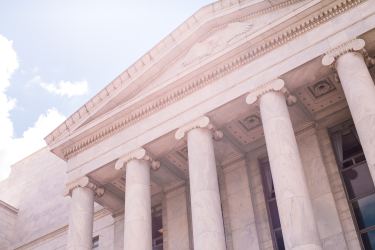
On this day in 1786, Thomas Jefferson’s Virginia Statute for Religious Freedom was adopted by the Virginia General Assembly. This statute greatly shaped the First Amendment of the U.S. Constitution, which protects the freedom of religion for all Americans, along with religious protections in state constitutions. As a result, January 16th has been proclaimed Religious Freedom Day by the President since 1993. Let’s take a look at what religious freedom means for the United States.
All the way back in the seventeenth century, before America was even a “formal” country, Europeans made the long and dangerous trip across the Atlantic to flee religious persecution and settle in a new land. As a result, the founders of America were uniquely aware of and sensitive to the importance of religious freedom.
Once the United States of America officially became an independent country, the Founding Fathers knew that religious liberty needed to be a core part of our founding documents. Thomas Jefferson wrote the Virginia Statute for Religious Freedom in 1777, which influenced James Madison when he wrote the First Amendment, including significant measures to protect religious liberties, which was adopted in 1791.
In the two centuries since, our country has had many discussions to further clarify what religious liberty means and set parameters for when religious liberty does and does not apply.
While religious freedom has historically meant protecting the practice of religious beliefs from outside influence, today it is often portrayed as though it was intended to protect people from religion. For example, one of the most common phrases associated with religious freedom is the “separation of church and state,” often used in the context of trying to keep religion out of public life. What is interesting, though, is that this phrase is not found in the U.S. Constitution. It is, however, found in other constitutions, such as the one for the Soviet Union.
The phrase originated in a letter that Thomas Jefferson wrote, known as the Danbury Letter. The letter was written to a group of Baptists, a religious minority who faced intense persecution at the time. The phrase was included in Jefferson’s letter to reassure the Danbury Baptists that the government would not try to interfere with or punish them for their religion.
Not only is this phrase not in America’s founding documents, but it was actually stated in the context of keeping the state out of the church, and not the opposite. The idea was that the government was not to establish a national religion, and it was also not to keep individuals from exercising or expressing their personal beliefs or convictions.
Over the last decade, religious freedom has become a more and more contentious topic. Just in the last two years, there were three major court cases addressed by the U.S. Supreme Court (SCOTUS) that dealt with religious liberty. Coach Joseph Kennedy won his seven-year legal battle that resulted from his commitment to say a private prayer at the end of every high school football game he coached. Website designer Lorie Smith also had to defend her right not to be forced to design a website for the wedding of a same-sex couple. We are so thankful that SCOTUS ruled in favor of protecting religious liberty in both of these cases, but there are still many cases that are not so favorably resolved. For example, Jack Phillips is a Colorado cake artist who has dealt with legal problems since 2012 for refusing to design cakes celebrating issues that he doesn’t agree with. In his first case, which related to his refusal to create a custom cake for a same-sex ceremony (offering to sell them suitable cakes that were already made), SCOTUS ruled in his favor after a six-year battle. A new case was brought against him one month later when he declined to create a cake celebrating a sex change (again after his offering to sell a similar cake that was already made). It was announced in November 2023 that the Colorado Supreme Court will hear his case, and we pray it will uphold his religious liberty.
On this Religious Freedom Day, we encourage you to think about the blessing of religious freedom. It can be easy to take for granted, but it truly is a key part of America’s history. In the midst of our culture trying to secularize everything, it is critical that we continue to fight for the protection of religious liberty.